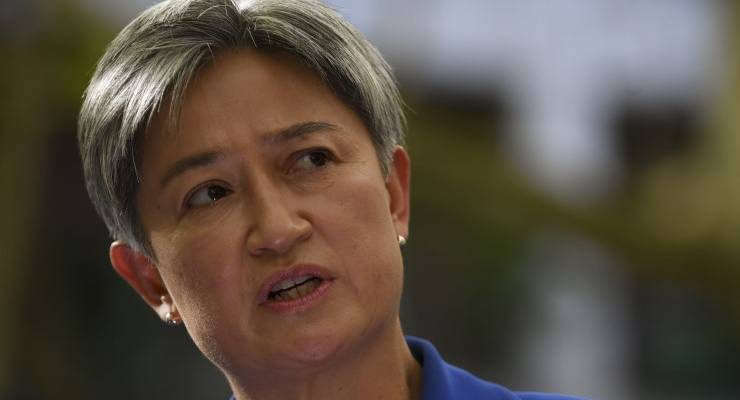
China’s efforts to upend Western predominance in the Pacific came into greater focus on Wednesday following the emergence of a new agreement intended to deepen Beijing’s ties to the region.
In a draft communique and five-year action plan sent to 10 Pacific island nations — Solomon Islands, Kiribati, Samoa, Fiji, Tonga, Vanuatu, Papua New Guinea, the Cook Islands, Niue and the Federated States of Micronesia — China has proposed new agreements on security and technology cooperation that have Western capitals worried.
The pending agreement is a direct challenge to the new Australian government under Prime Minister Anthony Albanese, who has vowed a response. In a sign of the new government’s focus, his Foreign Affairs Minister, Penny Wong, arrived in Fiji on Thursday.
She was followed close behind by Chinese Foreign Minister Wang Yi, who arrived in the Solomon Islands on Thursday as part of a seven-nation tour. He is set to discuss the plan with Pacific Island leaders in Fiji on May 30.
Despite China’s interest, the region remains deep within Australia’s orbit, said Jonathan Pryke, an expert on the Pacific islands at the Lowy Institute in Sydney.
“If you just look at the numbers, the level of engagement from all partners in the Pacific, Australia is still the largest donor, the largest trading partner, the largest migration partner to the region,” Pryke said. “This notion that China has just swept in and taken over the region is totally false.”
In a recent FP Live interview, former Australian prime minister Kevin Rudd blamed China’s progress in the region on the former Liberal prime minister Scott Morrison’s government for alienating its neighbours.
To rebuild ties, Rudd recommends synchronising Australia’s climate change policies with those of its island neighbours, many of which are particularly vulnerable to the catastrophic impacts of a warming planet.
China has maintained that its intentions in the region are benign, but Western policymakers see a threat.
“The Australians and Americans will be looking at these kinds of Chinese projects that are similar to what they’ve done in the South China Sea,” Mick Ryan, a recently retired two-star major general in the Australian Army, told Foreign Policy last week. “They were never going to be militarised, and then all of a sudden, guess what?”
While any Chinese investment is attractive for the region, not all leaders have welcomed the Chinese plan. Micronesian President David Panuelo has urged his fellow leaders to reject it, arguing in a letter that it would foster a “cold war” between China and the West.
The Pacific island states are far from bystanders in the rivalry between China and the West and know full well that there is value in playing the two sides off each other.
“They wield their sovereignty very effectively. You can’t underestimate how sophisticated they can play the game of geopolitics,” Pryke said.
If Australia’s history is any indication, China is unlikely to supplant Western influence overnight.
“In the past, there have been times where Australia has been really heavy-handed, where we’re trying to get the region to do what we want and they still do what they want because they’re sovereign nations,” Pryke said.
“And so, to think China’s just going to run roughshod over the whole region — well, that is quite revealing of how little people know about the Pacific.”









By what principle or rule (we are talking about the ‘rules-based international order, aren’t we?) does the US have to be dominant in the western Pacific, including in the South China Sea? Would this principle allow the PRC to be dominant in the Gulf of Mexico?
Amazing, isn’t it? Moving the NATO military alliance right up to Russia’s border is not a provocative act and is no threat to Russia, so Russia has no right to see this as any sort of threat, and we affirm Ukraine’s sovereign right to join any alliance it wishes, yet the mere thought of China setting up a navy base 2,000km from Queensland is seen by Australia and a clear threat to our security, even an existential threat and a red line the Solomons must not cross.
What an excellent example of Australia’s hypocrisy and double standards.
What you state is normal across the West. The West refuses to even acknowledge that it’s actions can be threatening to its “competitors” but anything done by “competitors” is always a threat. Why? Because it threatens the White, Western “Global Order” that only benefits the West.
Also a red line to the US, 12,000kms away.
The LIBS spent their entire tenure feathering their own nests. They had no interest in government and, as we saw repeatedly, they where always surprised when something burst into their consciousness. Reminds me of those road safety ads where drivers are surprised to find that while they were checking their texts they were on a collision course.
The state of the Pacific falles into this category. They just werent watching. Didnt give a rats. Now its a mess for someone else to sort out.
If I were a Pacific leader, it’s fishing rights I’d be on guard about.
The Liberal and National parties never learned the lesson of the Strategic value of the Islands of The South Pacific. If their members had some who remembered the lessons of the second world war, it may have been different. Japan and the USA certainly learned the lessons well. It was too much to expect that current politicians had any inter4est in the value of these counties.
Yes our political leaders, according to our MSM are pretty dumb, albeit it may actually be the latter. Its like a large dog walking down the street marking out its territory and the little white Australia poodles hiding in fear whilst yelping madly to express their disdain.
The poodles have expressed their failure already by their actions. But they are cute and hope to be protected by the big dog on the other side of the pond.